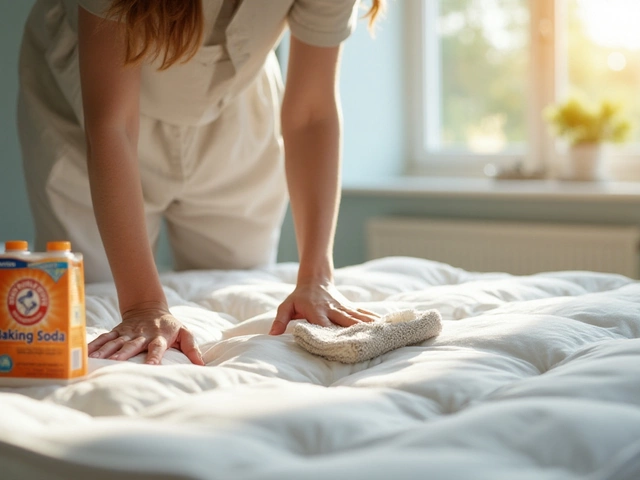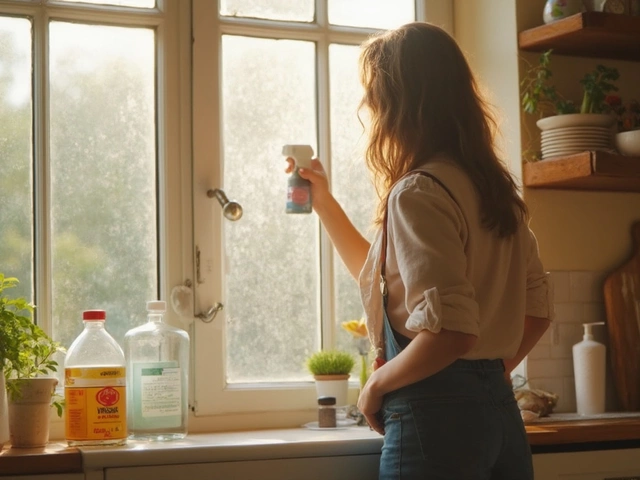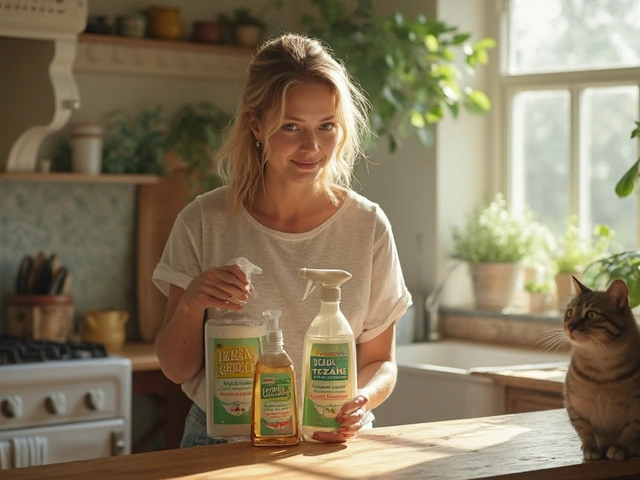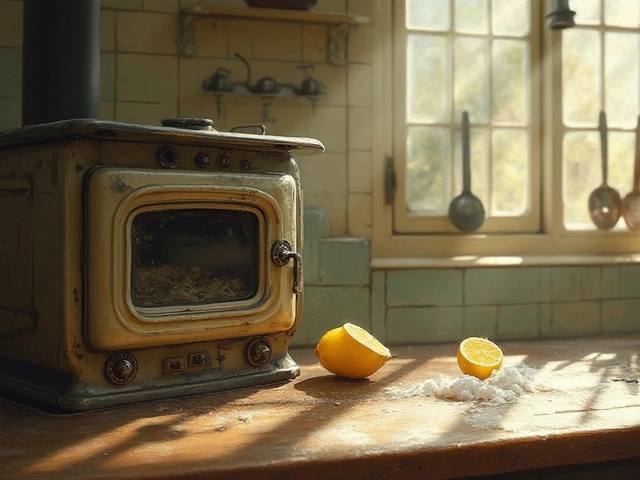Ever notice how pros leave windows so clean, you could swear there wasn’t glass there at all? The truth isn’t a fancy secret—it's all about using the right detergent and knowing a few insider tricks. Most professionals aren't reaching for anything you can't get your hands on; but what they pick matters more than you might think.
Window cleaning detergent isn’t just soap. Professional cleaners look for stuff that leaves zero residue, doesn’t streak, and breaks down tough grime fast. If you grab your average dish soap, you might get a shiny window, but it’ll probably leave streaks and attract dust afterward. Not ideal, right? That’s why pros go with proven brands and stick to certain formulas.
- What Sets Pro Detergents Apart
- Popular Brands Professionals Swear By
- Added Ingredients: Yes or No?
- Mixing: The Right Ratio Matters
- What About Home Remedies?
- Common Pitfalls (And How to Dodge Them)
What Sets Pro Detergents Apart
So, what makes a detergent good enough for the pros? For starters, it’s all about performance. Professional window cleaning detergents are designed to cut through the oily fingerprints, dusty buildup, and water spots that regular soaps just smear around. They’re not loaded with fancy scents or unnecessary additives—just focused ingredients that get the glass spotless, fast.
Most pro-grade detergents are low-suds formulas. That might sound odd if you’re used to thinking that more bubbles means more clean, but on glass, suds just slow you down and leave residues. The main goal is a streak-free finish, so the ingredients are picked to evaporate clean and leave nothing behind. Many pro detergents even have water softeners built in, which helps if you’re in a hard water area (no chalky spots after drying).
Another big thing: these detergents are concentrated. That means a little goes a long way—pros mix just a few drops in a whole bucket of water. It's both cost-effective and easier on the environment because you're not dumping in unnecessary chemicals every time.
Some pro detergents are biodegradable, which is great when you’re rinsing down driveways or gardens. And because they’re made to be gentle, you’re not worried about damage to window seals, frames, or plants below.
- Low-suds to avoid streaking
- Concentrated for efficiency and cost savings
- Water softeners to fight spotting
- Gentle on seals and landscaping
- Often biodegradable for eco-friendliness
The takeaway? Pro detergents are about real results, not fancy packaging, and they're made to nail the job—clear, streak-free, and safe for everything around the window.
Popular Brands Professionals Swear By
When you see window cleaners on big city buildings or rolling up to a homeowner’s driveway, odds are they aren’t messing around with random soap from the grocery aisle. Instead, pros have a few favorite brands that have basically become the industry standard for getting glass streak-free the first time.
One of the biggest names out there is Unger. Most pros trust Unger’s Liquid Professional Glass Cleaner, which is made to cut through dirt and grease without leaving any streaks. Then there’s Ettore—another heavyweight that offers concentrated window cleaning solutions. Cleaners like Ettore Squeegee-Off keep suds light, which helps you see what you’re doing and avoid soap buildup.
If pros want something truly heavy-duty (like for storefronts near busy streets), Glass Gleam 4 and Glass Gleam 3 from Titan Laboratories are a go-to. These are super concentrated; you only need a tiny bit per gallon of water. They’re designed not just for cleaning, but to slow down dirt buildup, so you don’t have to clean as often. That’s a big deal for jobs with lots of repeat business.
- Window cleaning brands like Unger, Ettore, and Titan Labs are popular for a reason—they’re reliable, easy to mix, and safe for glass.
- Most pro cleaners prefer concentrated formulas—they’re cheaper per job and work better with hard water.
- Read the label: About 80% of pros use products specifically labeled “for professional use” (according to the American Window Cleaner Magazine’s 2024 survey).
| Brand | Popular Product | Why Pros Like It |
|---|---|---|
| Unger | Liquid Professional Glass Cleaner | Zero streaks, easy rinsing, works in cold and warm weather |
| Ettore | Squeegee-Off | Low suds, strong on grime, super concentrated |
| Titan Labs | Glass Gleam 4/3 | Slows dirt buildup, great in hard water, lasts ages |
If you're curious why these brands beat out regular dish soap: concentrated formulas mean less water spotting and fewer chemicals left behind. Plus, some are designed to work better with squeegees—so you’re not fighting stubborn bubbles or weird residue as you work. That’s how the pros get those perfect, clear windows every time.
Added Ingredients: Yes or No?
Let’s clear up some confusion. Not all pro window cleaners stick to just detergent and water. Some add extras for very good reasons—but it’s not random. The main goal? Get the glass super clean without causing problems later. For example, some cleaners toss in a splash of isopropyl alcohol for quick evaporation on chilly or rainy days. Others swear by a little ammonia when tackling greasy buildup, especially on storefronts or kitchen windows. But too much alcohol dries too fast and can leave smudges. Ammonia works well, but it’s harsh and can damage seals or painted frames over time.
Here’s a quick rundown of common additives and what they do:
- Isopropyl Alcohol – Speeds up drying, helps on humid days, but can leave streaks if overused.
- Ammonia – Breaks down heavy grease, but it can degrade window seals or tint.
- Vinegar – A classic for cutting mineral spots, but commercial pros rarely use it outdoors since it doesn’t tackle grime as well as pro solutions.
- Dish Soap – Easy to mix in, but too much leads to streaks and residue. Most pros keep it to just a few drops.
Professional window cleaners keep things simple. They rarely use a bunch of additives unless the job calls for it (like old, greasy windows in restaurants). Most jobs just use pure water and a squirt of quality window cleaning detergent—no more, no less.
| Added Ingredient | Main Benefit | Main Drawback |
|---|---|---|
| Isopropyl Alcohol | Speeds drying | Possible streaks if overused |
| Ammonia | Breaks tough grease | Harsh on seals/paint |
| Vinegar | Cuts mineral spots | Weak on grime |
| Dish Soap | Cuts light dirt, adds glide | Streaks if overused |
Bottom line? If you want results like the pros, keep it simple. Only add extra stuff when the job truly needs it, and don’t go overboard with kitchen experiments. Less really is more here.
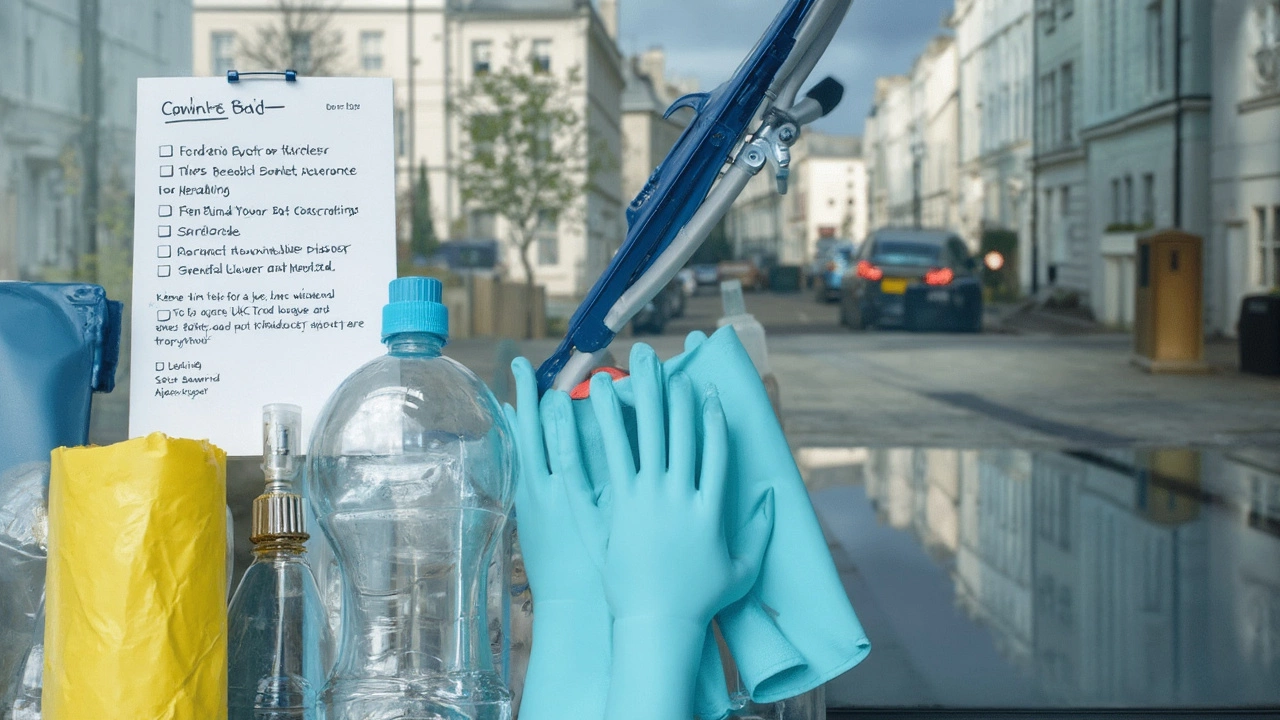
Mixing: The Right Ratio Matters
Getting the right mix for your window cleaning detergent makes all the difference between a window that shines and one that looks like you cleaned it with bacon grease. Most professionals don’t follow some mystery recipe, but they do pay attention to the details of how much detergent goes into their bucket.
The sweet spot for most pro brands is pretty simple: 1 to 2 teaspoons of concentrated window cleaning detergent per gallon of water. Go heavier and you’ll deal with streaks and more time rinsing; go too light, and the dirt sticks around or you end up scrubbing twice as hard. Most pros use cold or room-temperature water, since hot water dries too fast and leaves spots.
Some cleaners add just a splash of regular dish soap if they're out of the good stuff, but never more than half a teaspoon per gallon—otherwise, hello suds and smeary windows. Always mix your detergent after you add water, not before, or you risk over-sudsing. Yeah, there’s a reason you never see pros dunking a giant gloppy bottle of soap straight into the bucket.
If you’re new to this, it can help to test your mix on one window first. If it feels greasy or leaves bubbles, dilute it a little more next time. The goal is slippery, not foamy.
Last tip: change your solution often—especially if you’re cleaning super dirty windows. Dirt and gunk throw off your mix and ruin your hard work fast. Fresh batch, every few windows, is the pro way.
What About Home Remedies?
You’ve probably seen a dozen different hacks for window cleaning online—stuff like vinegar, ammonia, or cornstarch. Some of these do the job in a pinch, but do they measure up to what the pros use? Not exactly, but that doesn’t mean they’re useless.
Take vinegar and water, for example. Mix them (usually about 50/50) and you get a cheap cleaner that can cut through basic grime. But vinegar doesn’t lather, and it doesn’t handle greasy fingerprints or sticky residues as well as professional products. You’re also on your own for scent—vinegar has a tendency to linger unless you rinse extra carefully.
If you’re stuck without a window cleaning detergent, a drop of dish soap in a bucket of warm water can work. Just go easy on the soap: about a teaspoon per gallon. Too much, and you end up with streaks that are tough to buff out. Some folks swear by adding a little cornstarch for extra shine, but keep in mind it can clog up your spray bottles or tools if you’re not careful.
- Vinegar and water (1:1 ratio): Cheap, works for basic dirt but not the best against oily messes.
- Dish soap and water: A go-to in a pinch. One teaspoon per gallon—seriously, don’t overdo it.
- Cornstarch addition: Can boost shine, but mix thoroughly and avoid spraying through spray bottles to skip potential clogs.
- Avoid ammonia indoors: While it cleans well, breathing in ammonia isn’t great for anyone. Always ventilate or choose another option.
Here's how these home remedies compare in terms of cost, cleaning power, and streaking:
| Home Remedy | Cost | Cleaning Power | Risk of Streaks |
|---|---|---|---|
| Vinegar & Water | Very Low | Moderate | Low to Medium |
| Dish Soap & Water | Very Low | Good | Medium (if too much soap) |
| Cornstarch Blend | Low | Good (with care) | Low if mixed well |
Bottom line? Home remedies get you pretty far for basic jobs and won’t break the bank. But if you want that pro-level shine and time is money, the professional detergents are still way ahead.
Common Pitfalls (And How to Dodge Them)
Even basic window cleaning jobs can go sideways if you don’t know the common mistakes people make. Some of these are the reason your glass still looks foggy, streaky, or worse, dirtier than when you started. Pros know these pitfalls, so let’s spell them out and show you how to stay clear.
First, too much detergent is a classic mistake. More isn’t better. If you dump in too much cleaner, it just leaves soap marks behind. Stick to the recommended amount on the label or around a teaspoon per gallon of water if you’re using a pro product.
Next up: dirty tools. Cleaning with an old rag or a grimy squeegee only drags junk across the glass. Always rinse your squeegee between strokes and swap out cloths as soon as they look questionable.
Hard water is a sneaky enemy. If your water leaves spots on your drinking glasses, it’ll definitely mess with your windows. When possible, use distilled or filtered water—professionals swear by it for spotless results.
- Don’t clean windows in direct sunlight. The heat dries detergent and water too fast and leaves streaks.
- Avoid using paper towels—they break down and leave lint.
- Don’t skip the rinse or the dry step. Leftover residue is just dust waiting to happen.
Here’s a table with quick do’s and don’ts shared by real window cleaning pros:
| Do | Don’t |
|---|---|
| Use clean, soft microfiber cloths | Use dirty or rough towels |
| Work on cloudy days if possible | Clean glass when the sun is blazing |
| Rinse tools often | Reuse the same dirty water |
| Mix detergent in the right ratio | Eyeball it or overpour soap |
If you keep running into streaks, check your water source, tool cleanliness, and how much soap you’re using. Pro cleaners keep it simple, but they don’t cut corners. Neither should you.
